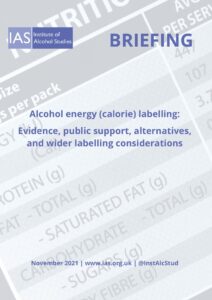View this report

- Alcohol is a highly energy dense foodstuff, and is estimated to comprise
- nearly 10% of calorie intake for those who drink
- Unlike pre-packaged foods, nutrition labelling – including calories – is not currently required on alcohol packaging in the UK
- People’s knowledge of the calories in alcohol is poor
- There is limited evidence that alcohol energy (calorie) labelling impacts on consumer behaviour, but the evidence is low quality and mostly measures intended rather than actual behaviour
- Across multiple studies and polls, at least 60% of the UK public support alcohol energy (calorie) labelling
- Energy content can also be conveyed using food equivalents or physical activity equivalents, which may be easier to understand
- Energy (calorie) labelling is one aspect of alcohol labelling, alongside health information and health warnings. The World Health Organization recommends that consumers deserve to know the contents of alcoholic beverages and the possible risks of drinking them
- Knowledge of the UK low risk drinking guidelines and health risks of alcohol is low. Health warning labels (e.g. cancer labels) increase awareness of alcohol-related harms, and evidence supports an impact on alcohol purchasing and consumption. Most of the UK public support alcohol health warning labels
- Alcohol energy labelling will help to provide consistent information, but should be considered alongside other aspects of alcohol labelling. Alcohol labelling is one component of a strategy to reduce alcohol harm, alongside other policies such as taxation and price regulation, and regulating availability and marketing
View this report
